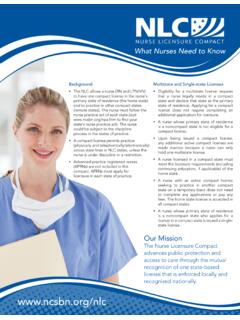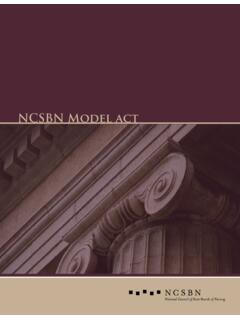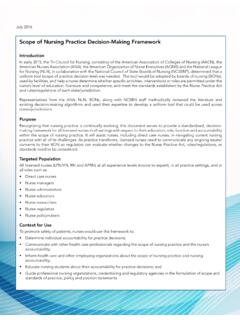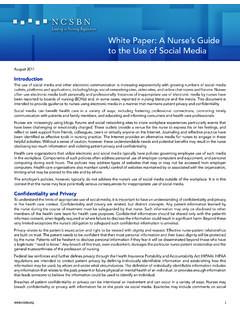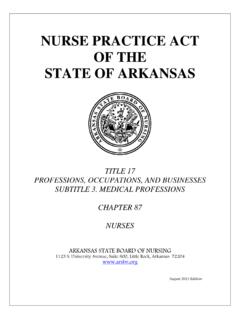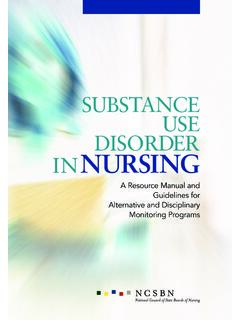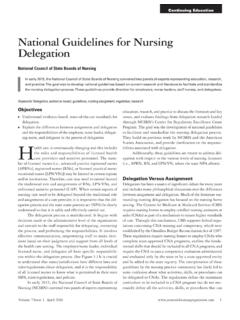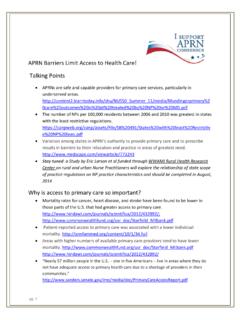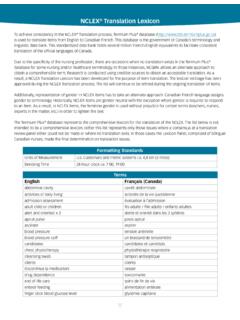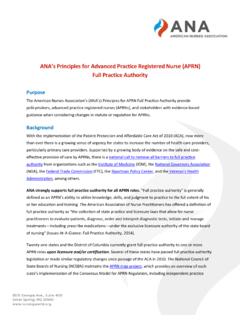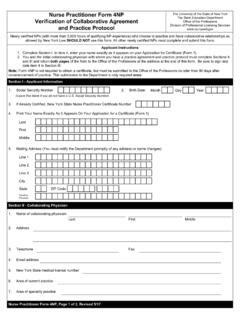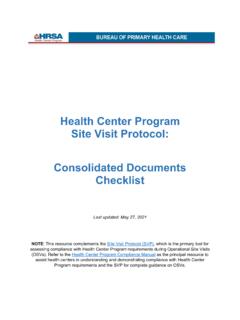Transcription of NEW MEXICO NURSING PRACTICE ACT CHAPTER 61 ARTICLE …
1 NEW MEXICO NURSING PRACTICE ACT CHAPTER 61 ARTICLE 3 61-3- 1. Short title. CHAPTER 61, ARTICLE 3 NMSA 1978 may be cited as the " NURSING PRACTICE Act". History: 1953 Comp., 67-2- 1, enacted by Laws 1968, ch. 44, 1; 2003, ch. 276, 1; 2003, ch. 282, 1; 2003, ch. 307, 4. 61-3- 2. Purpose. The purpose of the NURSING PRACTICE Act is to promote, preserve and protect the public health, safety and welfare by regulating the PRACTICE of NURSING , schools of NURSING , hemodialysis technicians and medication aides in the state. History: 1953 Comp., 67-2- 2, enacted by Laws 1968, ch. 44, 2; 1991, ch. 190, 1; 2001, ch. 137, 1. 61-3- 3. Definitions. As used in the NURSING PRACTICE Act: A. "advanced PRACTICE " means the PRACTICE of professional registered NURSING by a registered nurse who has been prepared through additional formal education as provided in Sections 61-3- through 61-3- NMSA 1978 to function beyond the scope of PRACTICE of professional registered NURSING , including certified nurse practitioners, certified registered nurse anesthetists and clinical nurse specialists; B.
2 "board" means the board of NURSING ; C. "certified hemodialysis technician" means a person who is certified by the board to assist in the direct care of a patient undergoing hemodialysis, under the supervision and at the direction of a registered nurse or a licensed practical nurse , according to the rules adopted by the board; D. "certified medication aide" means a person who is certified by the board to administer medications under the supervision and at the direction of a registered nurse or a licensed practical nurse , according to the rules adopted by the board; E. "certified nurse practitioner " means a registered nurse who is licensed by the board for advanced PRACTICE as a certified nurse practitioner and whose name and pertinent information are entered on the list of certified nurse practitioners maintained by the board; F. "certified registered nurse anesthetist" means a registered nurse who is licensed by the board for advanced PRACTICE as a certified registered nurse anesthetist and whose name and pertinent information are entered on the list of certified registered nurse anesthetists maintained by the board; G.
3 "clinical nurse specialist" means a registered nurse who is licensed by the board for advanced PRACTICE as a clinical nurse specialist and whose name and pertinent information are entered on the list of clinical nurse specialists maintained by the board; H. "collaboration" means the cooperative working relationship with another health care provider in the provision of patient care, and such collaborative PRACTICE includes the discussion of patient diagnosis and cooperation in the management and delivery of health care; I. "licensed practical nurse " means a nurse who practices licensed practical NURSING and whose name and pertinent information are entered in the register of licensed practical nurses maintained by the board or a nurse who practices licensed practical NURSING pursuant to a multistate licensure privilege as provided in the nurse Licensure Compact; J. "licensed practical NURSING " means the PRACTICE of a directed scope of NURSING requiring basic knowledge of the biological, physical, social and behavioral sciences and NURSING procedures, which PRACTICE is at the direction of a registered nurse , physician or dentist licensed to PRACTICE in this state.
4 This PRACTICE includes but is not limited to: (1) contributing to the assessment of the health status of individuals, families and communities; (2) participating in the development and modification of the plan of care; (3) implementing appropriate aspects of the plan of care commensurate with education and verified competence; (4) collaborating with other health care professionals in the management of health care; and (5) participating in the evaluation of responses to interventions; K. " nurse Licensure Compact" means the agreement entered into between New MEXICO and other jurisdictions permitting the PRACTICE of professional registered NURSING or licensed practical NURSING pursuant to a multistate licensure privilege; L. " NURSING diagnosis" means a clinical judgment about individual, family or community responses to actual or potential health problems or life processes, which judgment provides a basis for the selection of NURSING interventions to achieve outcomes for which the person making the judgment is accountable; M.
5 " PRACTICE of NURSING " means assisting individuals, families or communities in maintaining or attaining optimal health, assessing and implementing a plan of care to accomplish defined goals and evaluating responses to care and treatment. This PRACTICE is based on specialized knowledge, judgment and NURSING skills acquired through educational preparation in NURSING and in the biological, physical, social and behavioral sciences and includes but is not limited to: (1) initiating and maintaining comfort measures; (2) promoting and supporting optimal human functions and responses; (3) establishing an environment conducive to well-being or to the support of a dignified death; (4) collaborating on the health care regimen; (5) administering medications and performing treatments prescribed by a person authorized in this state or in any other state in the United States to prescribe them; (6) recording and reporting NURSING observations, assessments, interventions and responses to health care; (7) providing counseling and health teaching.
6 (8) delegating and supervising NURSING interventions that may be performed safely by others and are not in conflict with the NURSING PRACTICE Act; and (9) maintaining accountability for safe and effective NURSING care; N. "professional registered NURSING " means the PRACTICE of the full scope of NURSING requiring substantial knowledge of the biological, physical, social and behavioral sciences and of NURSING theory and may include advanced PRACTICE pursuant to the NURSING PRACTICE Act. This PRACTICE includes but is not limited to: (1) assessing the health status of individuals, families and communities; (2) establishing a NURSING diagnosis; (3) establishing goals to meet identified health care needs; (4) developing a plan of care; (5) determining NURSING intervention to implement the plan of care; (6) implementing the plan of care commensurate with education and verified competence; (7) evaluating responses to interventions; (8) teaching based on the theory and PRACTICE of NURSING ; (9) managing and supervising the PRACTICE of NURSING ; (10) collaborating with other health care professionals in the management of health care; and (11) conducting NURSING research; O.
7 "registered nurse " means a nurse who practices professional registered NURSING and whose name and pertinent information are entered in the register of licensed registered nurses maintained by the board or a nurse who practices professional registered NURSING pursuant to a multistate licensure privilege as provided in the nurse Licensure Compact; P. "scope of PRACTICE " means the parameters within which nurses PRACTICE based upon education, experience, licensure, certification and expertise; and Q. "training program" means an educational program approved by the board. History: 1978 Comp., 61-3- 3, enacted by Laws 1991, ch. 190, 2; 1993, ch. 61, 1; 1997, ch. 244, 3; 2001, ch. 137, 2; 2003, ch. 307, 5; 2005, ch. 307, 1. 61-3- 4. Criminal offender's character evaluation. The provisions of the Criminal Offender Employment Act [28-2- 1 to 28-2- 6 NMSA 1978] shall govern any consideration of criminal records required or permitted by the NURSING PRACTICE Act.
8 History: 1953 Comp., 67-2- , enacted by Laws 1974, ch. 78, 12. 61-3- 5. License required. A. Except as otherwise provided in the NURSING PRACTICE Act, no person shall use the title " nurse " unless the person is licensed or has been licensed in the past as a registered nurse or licensed practical nurse under the NURSING PRACTICE Act. B. Except as otherwise provided in the NURSING PRACTICE Act, unless licensed as a registered nurse under the NURSING PRACTICE Act, no person shall: (1) PRACTICE professional NURSING ; (2) use the title "registered nurse ", "professional nurse ", "professional registered nurse " or the abbreviation " " or any other abbreviation thereof or use any other title, abbreviation, letters, figures, signs or devices to indicate or imply that the person is a registered nurse ; or (3) engage in a NURSING specialty as defined by the board. C. Except as otherwise provided in the NURSING PRACTICE Act, unless licensed as a licensed practical nurse under the NURSING PRACTICE Act, no person shall: (1) PRACTICE licensed practical NURSING ; or (2) use the title "licensed practical nurse " or the abbreviation " " or any other abbreviation thereof or use any other title, abbreviation, letters, figures, signs or devices to indicate or imply that the person is a licensed practical nurse .
9 D. Unless licensed as a certified nurse practitioner under the NURSING PRACTICE Act, no person shall: (1) PRACTICE as a certified nurse practitioner ; or (2) use the title "certified nurse practitioner " or the abbreviations " " or " " or any other title, abbreviation, letters, figures, signs or devices to indicate or imply that the person is a certified nurse practitioner . E. Unless licensed as a certified registered nurse anesthetist under the NURSING PRACTICE Act, no person shall: (1) PRACTICE as a nurse anesthetist; or (2) use the title "certified registered nurse anesthetist" or the abbreviation " " or any other title, abbreviation, letters, figures, signs or devices to indicate or imply that the person is a certified registered nurse anesthetist. F. Unless licensed as a clinical nurse specialist under the NURSING PRACTICE Act, no person shall: (1) PRACTICE as a clinical nurse specialist; or (2) use the title "clinical nurse specialist" or the abbreviation " " or any other title, abbreviation, letters, figures, signs or devices to indicate or imply that the person is a clinical nurse specialist.
10 G. No licensed nurse shall be prohibited from identifying himself or his licensure status. History: 1953 Comp., 67-2- 4, enacted by Laws 1968, ch. 44, 4; 1977, ch. 220, 2; 1985, ch. 67, 2; 1991, ch. 190, 3; 1997, ch. 244, 4; 2001, ch. 137, 3; 2003, ch. 307, 6. 61-3- Temporary licensure. An applicant for nurse licensure pursuant to the NURSING PRACTICE Act may be issued a temporary license for a period not to exceed six months or for a period of time necessary for the board to ensure that the applicant has met the licensure requirements set out in that act, whichever is less. History: Laws 2001, ch. 137, 14. 61-3- 6. Administration of anesthetics. It is unlawful for any person, other than a person licensed in New MEXICO to PRACTICE medicine, osteopathy or dentistry or a currently licensed certified registered nurse anesthetist, to administer anesthetics to any person.
